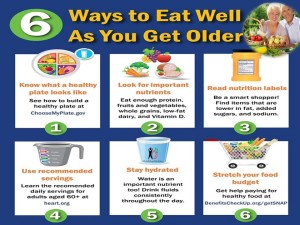Nutrition in old age seems to have a constantly higher meaning. Considering nutrition, seniors form a relatively large risk group of the population. In old age, many factors affect both the supply of nutrients and their absorption and usage. The aim of nutrition in old age seems to be the maintenance of the optimal health condition and prevention of nutrient deficiency.
Getting adequate nutrition can be a challenge as you get older. With age, the number of calories you need begins to decline. Every calorie you consume must be packed with nutrition in order to hit the mark.
Tips for Eating healthy as you age
•Eat nutrient packed food . Since many seniors aren’t eating as much as they should, the food they must be nutritionally-dense with plenty of fruits, vegetables and whole grainslike multi grain khicdi, porridges, smoothies.
•Enhance aromas and flavors. Appealing foods may help stimulate appetite, especially in someone whose senses of taste and smell aren’t what they used to be.
•Encourage healthy snacking. Many seniors don’t like to eat large meals or don’t feel hungry enough to eat three full meals a day. One solution is to encourage or plan for several mini-meals throughout the day.
•Avoid skipping meals – This causes your metabolism to slow down, which leads to feeling sluggish and making poorer choices later in the day.
•Reduce sodium (salt) to help prevent water retention and high blood pressure.
•Enjoy good fats Reap the rewards of olive oil, avocados, salmon, walnuts, almonds, peanuts, flaxseed, and other monounsaturated fats. The fat from these delicious sources can protect your body against heart disease by controlling “bad” LDL cholesterol levels and raising “good” HDL cholesterol levels.
•Add fiber. Avoid constipation, lower the risk of chronic diseases, and feel fuller longer by increasing your fiber intake from foods such as raw fruits and veggies, whole-grains, and beans.
•Avoid “bad” carbs. Found in foodsIll such as white flour, refined sugar, and white rice as they have been stripped of all bran, fiber, and nutrients.
•For long-lasting energy and stable insulin levels, choose “good” or complex carbs such as whole grains, beans, fruits, and vegetables.
•Have Calcium and vitamin D rich diet include milk, its product, chicken, nuts, eggs, sunlight exposure.
•Look for hidden sugar. Added sugar can be hidden in foods such as bread, canned soups and vegetables, pasta sauce, instant mashed potatoes, frozen dinners, fast food, and ketchup. Check food labels for other terms for sugar such as corn syrup, molasses, brown rice syrup, cane juice, fructose, sucrose, dextrose, or maltose.
•Hydrate well. As people age, they do not get thirsty very often, even though their bodies still need the same amount of liquids. Some people may need to have their amount of fluids restricted due to medical reasons such as kidney or liver disease. Make sure to check with your doctor.
•Take care of dental problems. Maintaining proper oral health can enhance nutrition and appetite.
•Get help with food preparation.
•Consult your doctor
Eat healthy Stay healthy Age Gracefully







